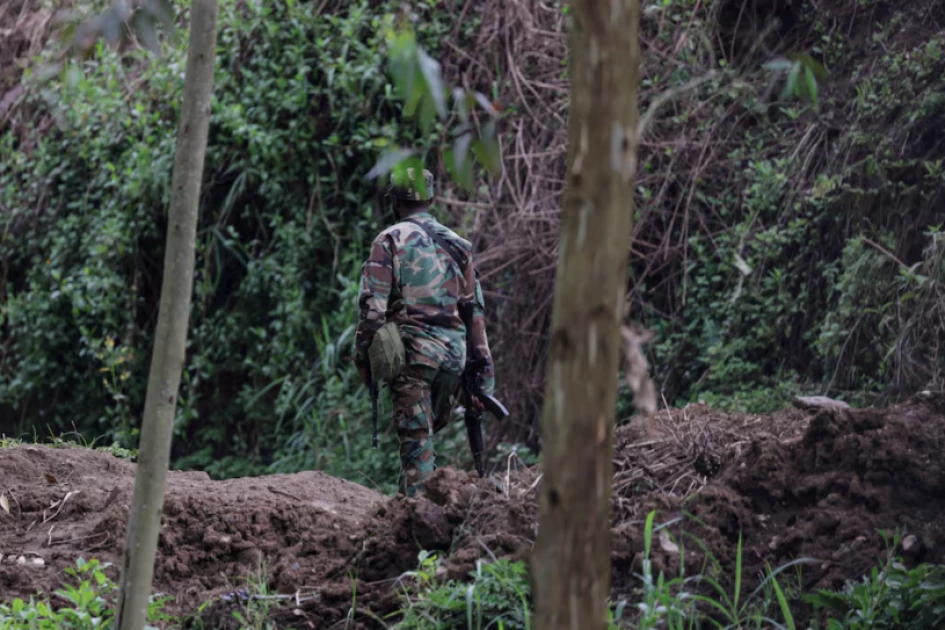Land quarrels in rebel-occupied Congo threaten Trump peace deal

An M23 rebel walks on the outskirts of Matanda which is controlled by M23 rebels, in eastern Democratic Republic of Congo, March 22, 2025. REUTERS/Zohra Bensemra/File Photo

Audio By Vocalize
Returning to land they fled during a violent advance by M23
rebels, some farmers in eastern Congo have had an unwelcome surprise: Their
fields of cauliflower and cabbage have been taken over by newcomers, including
Rwandans.
The resulting tensions could complicate efforts to bring peace and investment to a war-hit region that produces strategic minerals such as coltan, cobalt, copper and lithium.
Rwanda and Congo signed a peace
deal brokered by U.S. President Donald Trump's administration in June.
Peace talks between Congo and M23 in Doha were expected to produce a deal last
month but have been delayed.
The problem of land disputes became so widespread - with
hundreds of cases documented, according to unpublished U.N. data seen by
Reuters - that M23 created an "arbitration centre" to resolve them, a
senior rebel official said.
"Land conflicts can always fuel violence if they are
not properly addressed and if state structures are not sufficiently strong and
equipped to manage them," said Fred Bauma, head of the Congolese research
group Ebuteli.
"As part of the Doha agreements, this issue will have
to be addressed."
Abdu Djuma Burunga, 49, fled the breadbasket town of Kibumba
three years ago, towards the start of a resurgence by Rwanda-backed M23 that
led to its blitz through North and South Kivu provinces this year.
The fighting has killed thousands of people and displaced
hundreds of thousands. But Alliance Fleuve Congo, the rebel coalition that
includes M23, now wants to show it can govern and restore
order. Its forces have dismantled camps where people such as Burunga sought
shelter and urged - or forced - them to go home.
When he returned to Kibumba in April, Burunga found his
wooden house, in good shape when he left, in shambles. His fields were being
worked by strangers who "took our belongings and occupied our
fields," he said.
They wore civilian clothes and drank beer with M23
combatants, chatting in the Rwandan language of Kinyarwanda, said Burunga, who
has met the group of five and watched them come and go across the border.
Reuters could not independently confirm their identity and
nationality.
Though he appealed to M23-appointed local officials, Burunga
had to wait four months to get his land back, so the new arrivals could harvest
what they had planted. He retook possession of the land in August.
Elsewhere in Kibumba, Rwandan newcomer Mukumunana Penina
said she knew she was farming land that belonged to a Congolese farmer who
fled. She told Reuters she came to the land without M23 encouragement.
"This field belongs to a Congolese citizen. I don't
even know his name. I occupied it by planting potatoes there. I'm Rwandan, I
only occupied this field to survive," she said.
United Nations refugee agency survey results from February
and March, seen by Reuters, identified 200 families in Goma, eastern Congo's
biggest city, who said they were unable to return to their farmland, in many
cases because others were living and working on it.
The figure represents about 10% of those surveyed. The
survey did not specify who had taken over the land.
Occupation by Rwandans is a charged topic. A report by
U.N. experts published in July said Rwanda had exercised command and control
over M23 and Kigali was focused partly on "conquering additional
territories" in the region.
Kigali denies helping M23 but acknowledges deploying forces
in eastern Congo that it says act in self-defence against Congo's army and
ethnic Hutu militiamen.
A Rwandan government spokesperson did not respond to a
request for comment on whether Kigali was trying to seize land in eastern
Congo.
The senior rebel official denied most newcomers were
Rwandans, describing them as ethnic Congolese Tutsis who, fearful of ethnic
Hutu militias, had crossed the border since the 1994 Rwandan genocide.
The rebel official said the arbitration centre was
established after M23 seized Goma, and that sometimes newcomers agreed to leave
and sometimes newcomers and returnees agreed to share land.
The official said there was no policy of seizing land, but
acknowledged that some land-related rebel abuses had occurred.


Leave a Comment